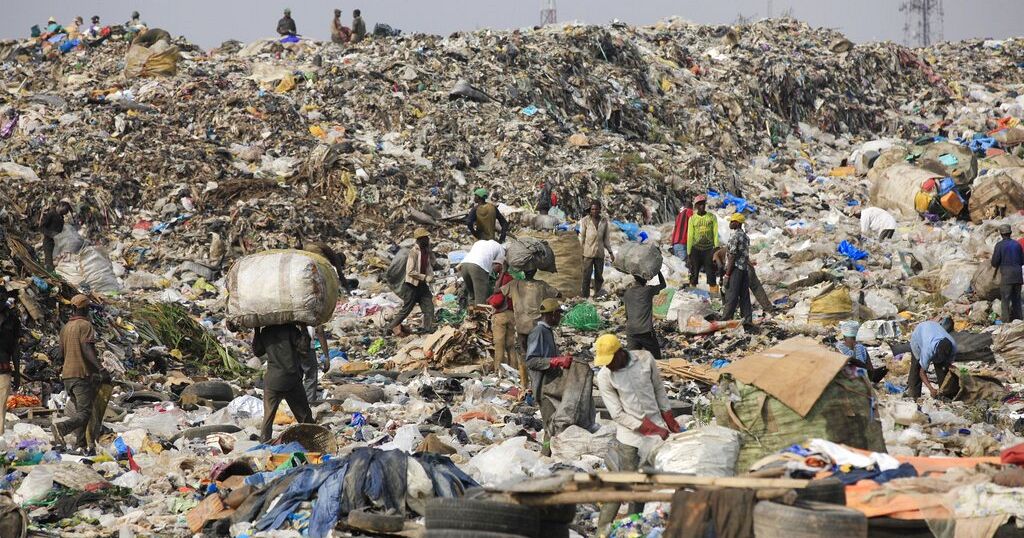
Waste pollution is a huge problem in Nigeria, with serious impacts on the environment. In response, the Lagos state government has banned styrofoam (a type of plastic widely used as food containers) and other single-use products.
Following a three-week moratorium for producers and sellers to mop up styrofoam containers, enforcement began on 4 March 2024.
In 2019, Nigeria was estimated to generate about 2.5 million tonnes of plastic waste yearly. Lagos State generated 8,400 tonnes of waste daily, of which 11% was plastic. The estimate is higher today.
The habit of residents discarding used plastic wherever it suits them hurts the environment in many ways. Evidence abounds of the impact in Lagos and other parts of Nigeria. Yearly, more than 130,000 tonnes of plastic waste end up in the country’s waterways. Producers of these plastics are not without blame: they are negligent about taking measures to combat the pollution their products cause.
As an expert in environmental and sustainability issues, who has studied the impact of plastic waste on the ecosystem in Lagos State, I have an informed view on how to deal with the problem. I argue that Lagos State would have achieved its objectives better had it taxed single-use plastics instead of banning them. The ban could undermine the potential success of the plastics value chain from a social, economic and environmental perspective.
A plastic ban is a costly measure which turns a small environmental problem into a bigger one. The ban could lead to black market sales, smuggling from neighbouring states, high costs for purchasing environmentally friendly alternatives and unnecessary expenses for monitoring, enforcement, evaluation and assessment.
In contrast, a tax on single-use plastic would create incentives to use less of this material.
Taxes work better than bans
Rwanda, Kenya and Uganda’s bans of single-use plastic offer lessons. The policy’s success has been limited by black market sales, smuggling and the high cost of eco-friendly packaging materials. Pollution from single-use plastic bags continues.
For example, Rwanda’s plastic bags ban affects traders and consumers who rely on them. Reusable bags offered as an alternative are not affordable, of inferior quality and not durable. This has led to smuggling across the border into Rwanda and an increase in black market sales.
The consequences of being caught are fines and imprisonment. But people are still finding ways to bring these plastic bags into Rwanda. Meanwhile, the resources put into monitoring, enforcement and evaluation cost taxpayers a lot of money.
Countries where single-use plastic tax has worked
Ireland, Belgium, Spain, the United Kingdom and Germany have successfully introduced a tax on single-use plastic.
In 2002, the Irish government saw a significant decrease in plastic bags after introducing a tax of €0.15 (US$0.16) at points of sale.
In 2007, the tax was increased to €0.22 (US$0.24), aiming to eliminate the use of plastic bags in the country. This approach helped the Irish government to solve part of its plastic waste problem. And the income generated helped to finance environmental projects, clean-up measures, education and awareness-raising measures. The tax also created incentives for alternatives to plastic bags.
In Germany, the city of Tübingen introduced a packaging tax of €0.20 and €0.50 for disposable containers and cutlery at the municipal level from January 2022.
From January 2023, styrofoam for food packaging was listed among the banned single-use materials in Germany. Food outlets had to provide alternatives. Retailers or consumers who can afford it can still buy styrofoam online, but sustainable alternatives are more affordable.
The German Ministry of the Environment said that a complete ban on single-use packaging was not yet possible under EU law, as there was not yet a completely environmentally friendly alternative. This approach has kept styrofoam producers in business and created opportunities for start-up companies interested in reusable production.
Plastic tax can check pollution
In Nigeria, a more effective approach would have been to introduce a plastic tax. It would create incentives by regulating the market costs for single-use plastics. The tax would force producers to switch to sustainable and reusable plastics. Also, consumers would have to decide whether it was worth paying more to use single-use plastics or opt for sustainable and reusable ones.
Income generated from the tax could be used to keep cities clean, raise public awareness, support recycling companies and promote sustainable, reusable and affordable plastics. The plastic tax revenue would be spent on monitoring, enforcement and evaluation.
Plastic tax has the potential to address the harmful effects of styrofoam and other single-use plastics if the abatement cost is analysed. Abatement costs are measures to reduce or eliminate the release of pollutants into the environment. For plastics, these costs are analysed based on the amount or units of plastic released and eliminated from the environment. Regular consultations, assessments and evaluations are necessary to achieve the targets set.
Plastic tax could serve as a bridge to the extended producer responsibility policy, which was adopted by the Nigerian Environmental Standards and Regulations Enforcement Agency in 2014 but is not yet fully in place. The policy requires producers to be responsible for their product until the end of their life cycle, including disposal and recycling.
This way, the true cost of plastic waste is revealed and sustainable alternative products are created within the plastics value chain.![]()
Kehinde Allen-Taylor, Researcher, Technical University Braunschweig
This article is republished from The Conversation under a Creative Commons license.

